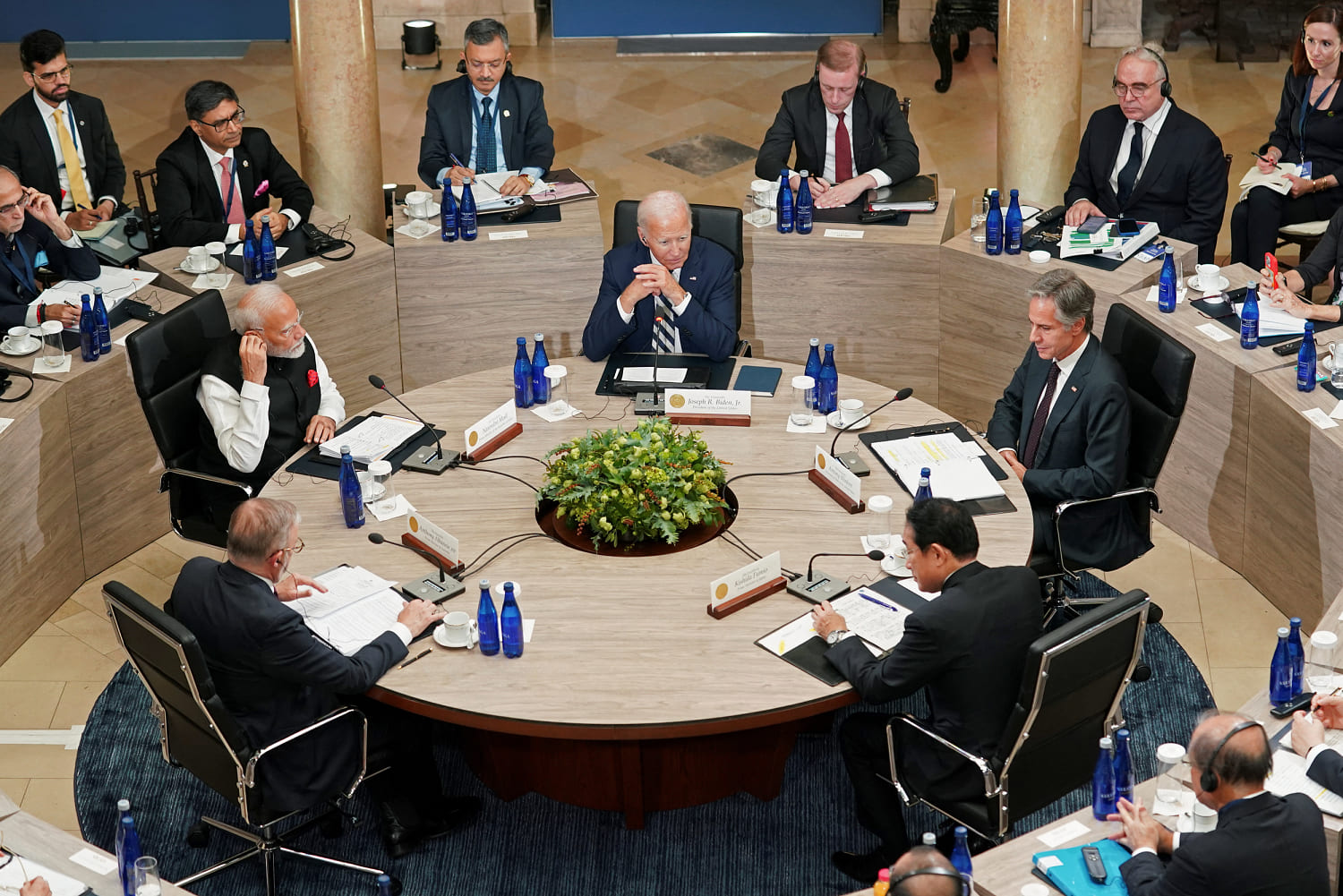
Leaders of Australia, India, Japan and the United States announced plans for new security initiatives in the Indian Ocean on Saturday, while outgoing U.S. President Joe Biden is hosting counterparts from the Quad grouping established out of shared concerns about China.
Biden welcomed Australian Prime Minister Anthony Albanese, Indian Prime Minister Narendra Modi and Japanese Prime Minister Fumio Kishida for a four-way meeting near his hometown of Wilmington, Delaware, to stress the importance of maintaining the Quad, which he sees as a signature foreign policy achievement, before he leaves office in January.
Senior Biden administration officials told reporters ahead of the meeting that the leaders would announce plans to expand an Indo-Pacific Partnership for Maritime Domain Awareness, launched two years ago to include the Indian Ocean region.
The leaders announced a plan for joint coast guard operations that will see Australian, Japanese and Indian personnel spend time on a U.S. Coast Guard vessel. The countries also announced plans for increased military logistics cooperation.
Before the meeting, officials said the leaders would step up work to provide critical and security technologies, including a new open radio access network, to the Pacific islands and Southeast Asia, regions of intense competition with China, Washington’s main strategic competitor.
A health initiative highlighted cooperation in combating cervical cancer as well.
Analysts said the expected outcomes would mostly build on work that has already been done within the Quad, which Biden elevated to summit level in 2021. Saturday’s meeting will be Quad’s sixth leader meeting.
Journalists were granted access to initial remarks from the leaders before a meeting on Saturday. However, after journalists were asked to leave, officials were briefly caught on hot mics discussing China during what was intended to be a private meeting.
“Our first topic of discussion is China,” said Secretary of State Antony Blinken after reporters were escorted out.
Moments later, Biden said, “We believe Xi Jinping is looking to focus on domestic economic challenges and minimize the turbulence in China diplomatic relationships. And he’s also looking to buy himself some diplomatic space, in my view, to aggressively pursue China’s interest.”
“China continues to behave aggressively, testing us all across the region. It is true in the South China Sea, the East China Sea, South China, South Asia and the Taiwan Strait,” Biden continued. “It’s true across the scope of our relationship, including on economic and technology issues. At the same time, we believe intense competition requires intense diplomacy.”
The president also pointed to his phone call with China’s President Xi Jinping earlier this year, as well as national security adviser Jake Sullivan’s trip to China this summer, adding that “we see this engagement as important for conflict prevention and crisis management amidst our strategic competition.”
The hot mic comments about China came after Sullivan was asked earlier on Saturday about whether the four leaders will focus on China.
“The Quad isn’t really about any other country. It’s not directed at another country,” Sullivan told reporters. “It’s directed at problem-solving, standing up for a set of common principles and a common vision for the region.”
“So I don’t think you should expect to see focus on any particular country, including the PRC in the Quad leader statement,” he continued, using the abbreviation for the People’s Republic of China.
Analysts said new maritime security initiatives at a time when China is stepping up pressure on its territorial rivals in the South and East China Seas would send a message to Beijing.
They said it would also represent a further shift of emphasis of the Quad’s activities to security issues, reflecting growing concerns about China’s intentions.
Lisa Curtis, an Asia policy expert at the Center for a New American Security who previously worked at the White House, CIA and State Department, said India, which is not part of any military alliance, has been worried about perceptions that the Quad could be militarizing the Indo-Pacific.
“But I think China’s recent maritime aggression could be changing the equation for India and could be prompting India to become a bit more open to the idea of Quad security cooperation,” she said.
Analysts and officials say Biden hosting the Quad is part of efforts to institutionalize the body ahead of his departure from office, as well as that of Kishida, who is stepping down after a leadership contest next week, and elections in Australia by next year.
“We’re expecting this Quad summit … to demonstrate the Quad partners are more strategically aligned than they have ever been, that they remain committed to putting real resources behind this effort to provide public goods for the Indo-Pacific, and most importantly, that the Quad is here to stay,” a senior U.S. official said.
The official noted that the Quad met at foreign minister level under the previous administration of Donald Trump, who is running against Vice President Kamala Harris in November, and enjoyed bipartisan support, as reflected by the formation of a congressional Quad Caucus ahead of the summit.
Albanese told reporters on Thursday that Canberra and Washington share concerns about China’s security ambitions in Pacific islands countries where Beijing is seeking a growing policing role.
“We’ll be discussing ways in which we can provide further support in the region to developing nations, including the action that we’re taking together on climate change and supporting their energy security,” he said.
